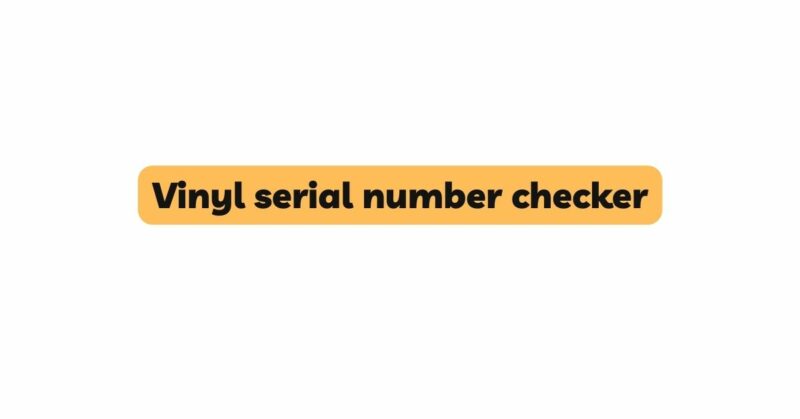Vinyl records are more than just music carriers; they are time capsules that capture the essence of the past. Embedded within their grooves are serial numbers—a unique sequence of characters that hold the key to the record’s origins, pressing plant, production year, and more. In the digital age, the power of technology has brought us vinyl serial number checkers, tools that enable collectors and enthusiasts to unveil the hidden stories behind their beloved records. This article delves into the world of vinyl serial number checkers, exploring how these tools work and how they empower us to decode the mysteries of vinyl records.
The Evolution of Vinyl Serial Number Checkers
Traditionally, uncovering the details behind a vinyl record’s serial number required meticulous research, reference books, and collaboration within collector communities. However, with the advent of the internet, digital databases, and collector websites, the process has been streamlined. Vinyl serial number checkers have emerged as invaluable tools that leverage technology to decode the information contained within serial numbers. These tools cater to collectors, enthusiasts, and even curious individuals seeking to unveil the stories locked within their vinyl treasures.
Understanding the Information Encoded in Serial Numbers
Before delving into the functionality of vinyl serial number checkers, it’s crucial to grasp the types of information encoded in serial numbers. These alphanumeric codes typically encompass the pressing plant, production year, batch details, and more. The pressing plant code points to where the record was manufactured, offering insight into production standards and quality. The production year, encoded directly or through decipherable codes, provides context for the record’s vintage. Matrix numbers etched into the run-out grooves can unlock details about mastering engineers and pressing dates. Armed with this understanding, enthusiasts can appreciate the depth of information that can be revealed through serial numbers.
The Functionality of Vinyl Serial Number Checkers
Vinyl serial number checkers operate as digital tools that automate the process of decoding serial numbers. These tools are available through websites, apps, and online databases specifically designed for vinyl collectors. Here’s how they work:
- Input the Serial Number: Users input the serial number found on their vinyl record into the vinyl serial number checker interface. This can be done by typing in the alphanumeric code or using a scanner to capture the code electronically.
- Instantaneous Analysis: Once the serial number is entered, the vinyl serial number checker quickly analyzes the code. The tool deciphers the information encoded in the serial number, such as the pressing plant code, production year, and other relevant details.
- Relevant Data Display: The vinyl serial number checker presents users with a comprehensive display of the information decoded from the serial number. This might include details about the pressing plant, production year, and potentially even matrix numbers.
- Contextual Information: Some vinyl serial number checkers go beyond the decoded information and offer contextual insights. This can include label variations, historical context, and notes about the pressing’s rarity or significance.
- Community Contributions: Many vinyl serial number checkers rely on community contributions and collaborative efforts. Users can contribute data from their own collections, enhancing the accuracy and depth of the tool’s database.
Benefits of Using Vinyl Serial Number Checkers
- Efficiency: Vinyl serial number checkers streamline the process of deciphering serial numbers, eliminating the need for extensive manual research.
- Accuracy: These tools leverage collective knowledge and digital databases, ensuring accurate decoding of serial numbers.
- Comprehensive Insights: Vinyl serial number checkers often provide not only decoding results but also additional contextual information about the record.
- Real-Time Access: Enthusiasts can access vinyl serial number checkers in real-time, empowering them to make informed decisions while examining records.
- Educational Value: These tools serve as educational resources, helping collectors learn about pressing plants, label variations, and other nuances of vinyl records.
- Community Collaboration: Many vinyl serial number checkers encourage users to contribute data, fostering a collaborative environment within collector communities.
Navigating the Limitations
While vinyl serial number checkers offer numerous advantages, it’s essential to recognize their limitations. Some serial numbers might be obscure or lack information in certain databases. Additionally, checkers may not account for unique anomalies or variations present in limited editions or specific labels. Thus, while these tools provide valuable insights, collectors should use them as part of a comprehensive approach that includes manual research, engagement with collector communities, and reference to archival resources.
The Ethical Use of Vinyl Serial Number Checkers
As with any technology, the ethical use of vinyl serial number checkers is paramount. Collectors should ensure they are using reliable and reputable tools to maintain the accuracy of the information they obtain. Additionally, contributing to the community by sharing accurate data and updates helps improve the overall quality and usefulness of these tools.
Conclusion
Vinyl serial number checkers have transformed the process of decoding vinyl record serial numbers, making it accessible, efficient, and accurate. These tools leverage technology to unlock the stories behind the records, offering collectors and enthusiasts a deeper connection to the music, the artists, and the historical context. As vinyl record collecting continues to thrive in the digital age, vinyl serial number checkers stand as invaluable companions on the journey to uncover the hidden narratives within the grooves.


